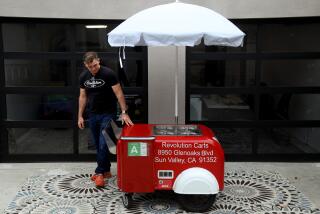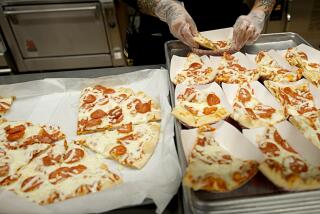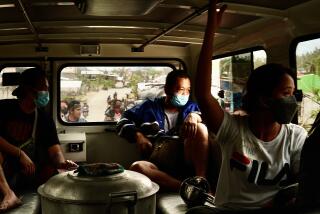Food Brings Home to U.S. Soldiers : Military: Candy and Kool-Aid help fight boredom in the desert.
- Share via
M & Ms and Charms may seem like unlikely army rations, but they are being served in the Saudi desert. For the 145,000 soldiers of Operation Desert Shield, the candy represents home.
It is hot in the desert--110 to 120 degrees at midday. Sand is constantly blowing through the air and getting in soldiers’ teeth. The days are long and boring. “When you have no access to anything to entertain you,” says Maj. Frank Takacs, chief of proponency division of the Army Center of Excellence Subsistence, U.S. Army Quartermaster Center and School, Fort Lee, Va., “food becomes a very big morale factor. It’s the one thing the troops look forward to.”
Takacs says that it is the army’s goal to feed everyone a cafeteria-type meal. “But,” he says, “we don’t have the facilities or the refrigeration to do so. T-rations and MREs fill that void.”
Tray or T-rations are meals put together from precooked, preproportioned food that is simply heated in boiling water, opened with a can opener and scooped onto plates. They are part of a new field kitchen system that eliminates the need for kitchen personnel and cooking from scratch. T-rations enable the military to feed about 200 soldiers with just a two-person crew. They are useful in the extreme heat of the desert where sanitation is a big concern and meals must be consumed very quickly.
Tray rations come in packages that feed 18 people. Containers are heated in huge vats of boiling water and emptied fast. The contents are served immediately to avoid bacteria development. Then the soldiers file past a heat table in the Army’s Mobile Kitchen Trailer and pick up the other components of the meal: pound cake, bread, milk, lemon beverage powder, coffee and peanut butter and jelly.
(A breakfast tray ration is a Western omelet, potatoes with bacon pieces, peaches, apple-cinnamon oatmeal, bread, milk, orange juice, coffee and cocoa.)
Meals Ready-To-Eat (MREs) are another matter. Like T-rations, MREs are precooked and prepackaged. But these sealed, flexible bundles of aluminum and plastic are individual servings that replace the canned C-rations that were once served to this country’s rank and file. They contain entrees ranging from beef stew to tuna and noodles.
MREs are lightweight, fit into a soldier’s pack and are easy to use when on patrol. The food doesn’t even need to be heated. The soldiers simply tear off the sealed edge and dig in with a plastic spoon (part of the kit). These shelf-stable meals--each lasts up to 36 months--are the result of years of research and evaluation. They make up at least one-third of the meals being consumed by American troops in Operation Desert Shield.
“A lot of testing has gone into the current MREs,” Takacs said. “Sensory evaluations were conducted by the soldiers so they could tell us what they like. (Their likes include name-brand candy, hot sauce and Kool-Aid. The Army also discovered that the soldiers prefer Tasters’ Choice to regular dehydrated coffee and precooked meats to freeze-dried.)
But MREs aren’t just a better tasting luxury. They are a necessity for survival, explains Harvey Keene, of the U.S. Army Natick Research and Development Center, the branch that developed them.
“We’re always looking for ways to make subsistence items lighter because a soldier can only carry so much weight. He’s hauling ammunition and food, and on extended patrol, every ounce or pound that you take off a subsistence load or equipment load translates into a greater combat load. He can carry another grenade, another clip of ammunition--something that allows him to survive in a firefight.”
However, the soldiers are not always off in the field eating food from pouches. When they are not on patrol they eat in mess halls that have been set up throughout the Arabian desert. And in the best of times they are eating a “cafeteria-type meal” of fresh food supplied by independent Saudi food service providers. Even when the mess hall is forced to serve T-rations or MREs, the meals are supplemented with fresh fruit, vegetables and milk.
“We’re sort of in a business like any other company,” says Takacs. “We’re trying to make sure that the customer is satisfied. It’s a continuous process.”
More to Read
Eat your way across L.A.
Get our weekly Tasting Notes newsletter for reviews, news and more.
You may occasionally receive promotional content from the Los Angeles Times.










